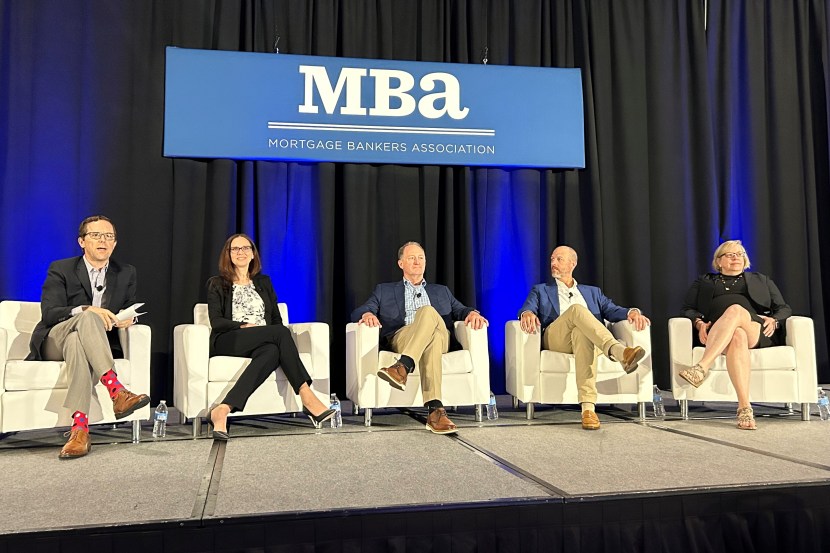
Origination Issues in Servicing: Communication Is Vital, Panel Says

(From left: David Harrison, Kristie Alvelo, Mike Morey, Michael Tanner and Heather Wright, by Anneliese Mahoney)
NEW ORLEANS–Making sure originators and servicers are on the same page–on a variety of topics–is helpful to avoid issues down the road, panelists said during a discussion at the Mortgage Bankers Association Commercial/Multifamily Finance Servicing and Technology Conference May 21.
When asked to list the main origination-based issues that affect the loan servicing process, the panelists quickly cited various blunders or problems related to communication.
“When documents do not say what the borrower thinks they say and we have to help interpret,” said Kristie Alvelo, Senior Vice President of Servicing Special Requests, Berkadia, New York.
“It’s also communication and managing everyone’s expectations on both sides all the time,” said Mike Morey, Vice President and Managing Director, StanCorp Mortgage Investors, Hillsboro, Ore.
“The originators [are] in the deal so much longer before the file gets [put] on the servicers’ desk, there’s all these side conversations and other sorts of agreements that have gone on or weren’t even documented, or handshakes. And then no one bothered to tell the servicing side what was going on,” added Michael Tanner, President of Pacific Southwest Realty Services, San Diego.
Tanner, who noted that he originally comes from the originations side, said part of the problem can come from games of telephone internally or when different functions of the business might use different language or terminology.
“I think the biggest thing I see is there’s no proactive communication,” said Heather Wright, a Partner at Bradley, Birmingham, Ala. She said she sees people trying to solve for problems that have already happened, instead of proactively trying to identify issues before they appear.
Tanner noted the value in each side understanding each perspective. “The more we understand each side of the role and how they’re viewing things, it does make a difference,” Tanner said.
Among other challenges, the panel touched on the current environment and managing distressed loans.
David Harrison, Chief Operating Officer, Midland Loan Services, Overland Park, Kan., noted managing distressed loans now is different than it was in the great financial crisis and even during COVID, in part because many in the industry expected some relief from interest rates earlier this year. But that relief hasn’t come yet, and projections have changed fairly significantly.
“The first real challenge is the fact that we don’t have anybody really left that was around during the great financial crisis that operated on workouts,” Morey noted, stressing the importance of institutional knowledge.
Alvelo again pointed to both the importance of communication and being proactive. “My role is to not get them into special servicing. And we need a proactive approach of smelling out the issues through heavy surveillance and getting the originators involved if necessary,” she said.
However, Alvelo, and the other panelists, noted that there’s obviously some differences in approach depending on various factors, such as CMBS deals.
When it comes to other current challenges, such as insurance, Wright noted that further communication can–again–be helpful.
“I do think there’s a lot more we can do with educating loan officers on insurance, what the role of insurance is, so they can communicate that with a borrower,” she said.
